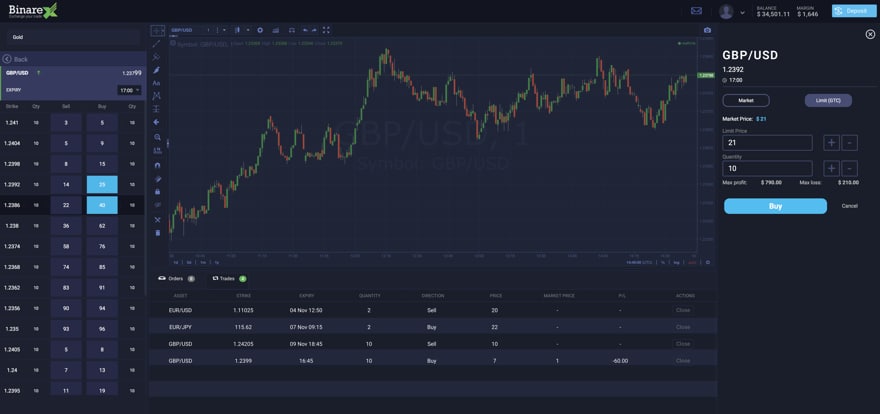The evolution of binary options into exchange trading is gathering speed. With regulatory pressure piling up, companies need to find adequate ways to address the challenges for the industry.
Tradologic is one of the first technology providers to move trading onto an exchange model with its product BinarEx. The step is big and bold, however the transition to a whole new product will hinge on end-users understanding it. In order to make the transition smooth for existing clients, brokers who are offering the product will need to commit enough resources for education.
Exchange traded binary options on BinarEx are somewhat different to the typical simplistic ‘call’ and ‘put’ product that we are used to seeing. Tradologic’s exchange is delivering to traders an experience that is way more advanced from a trader’s perspective.
BinarEx is a real exchange with a clearing house that matches the trade to a counter-party.
Starting with the charting of the product, the binary options technology provider has chosen to team up with one of the market leading solutions, TradingView. The integration of powerful analysis tools is the first step towards making binary options a product that is supported by regulators.
With the US CFTC forcing binary options onto an exchange, clients of Nadex and Cantor Exchange across the Atlantic are already familiar with the experience. European regulators should endorse the same direction and support the shift of the binary options industry into this new direction.
Trading Interface
The first screen of the BinarEx platform a trader sees is widely familiar – a list of assets for trading a chart and open orders and positions. Tradologic has done a great job with the integration of TradingView’s top notch charting solution.
Looking at the assets list, traders of binary options have a good variety to choose from with more incoming assets to be launched soon.
Once a trader selects an asset, an option chain is presented with different strike price levels. This solution is close to the Japanese ‘ladder’ binary options. When a price level and the direction of the trade are selected, an order screen pops up, where the market price for the option is displayed and the maximum profit and the maximum loss for the trade are presented.
This part of the trade introduces a new layer for the trader, one that regulators have been actively advocating: on every position, the client can see the maximum profit and the maximum loss.
Aside from a market order, a trader can also enter a limit order, which by default is with a Good Till Cancelled (GTC) status. The calculations are fairly simple – if the price of the option linked to the level is 40, the trader can lose as much as 40 currency units if the level is not met by the time of the expiration of the option. After subtracting the price from 100, the trader will get the maximum profit on a trade – a simple risk-reward ratio calculation.
Traders can choose the time of the expiration which is every 15 minutes (unlike in Japan, where the minimum interval is at least every 2 hours). Once the option expires, the trade is closed and the P/L from the deal is reflected on the balance.
Fees, Commissions and Conclusion
On BinarEx, end-clients will pay commissions to the broker on every deal that they make. Opening a position will cost 3% of the deal’s value, and if the trade is profitable the client will pay another 3%.
Tradologic’s solution is a powerful one and it can be very successful if the traders are given enough information how to trade. The educational efforts which the brokers make will be key to the success of the product.
Tradologic is planning to launch a mobile app to compliment BinarEx. Brokers can already sign up with the technology provider to test and assess the product for themselves.





Be First to Comment